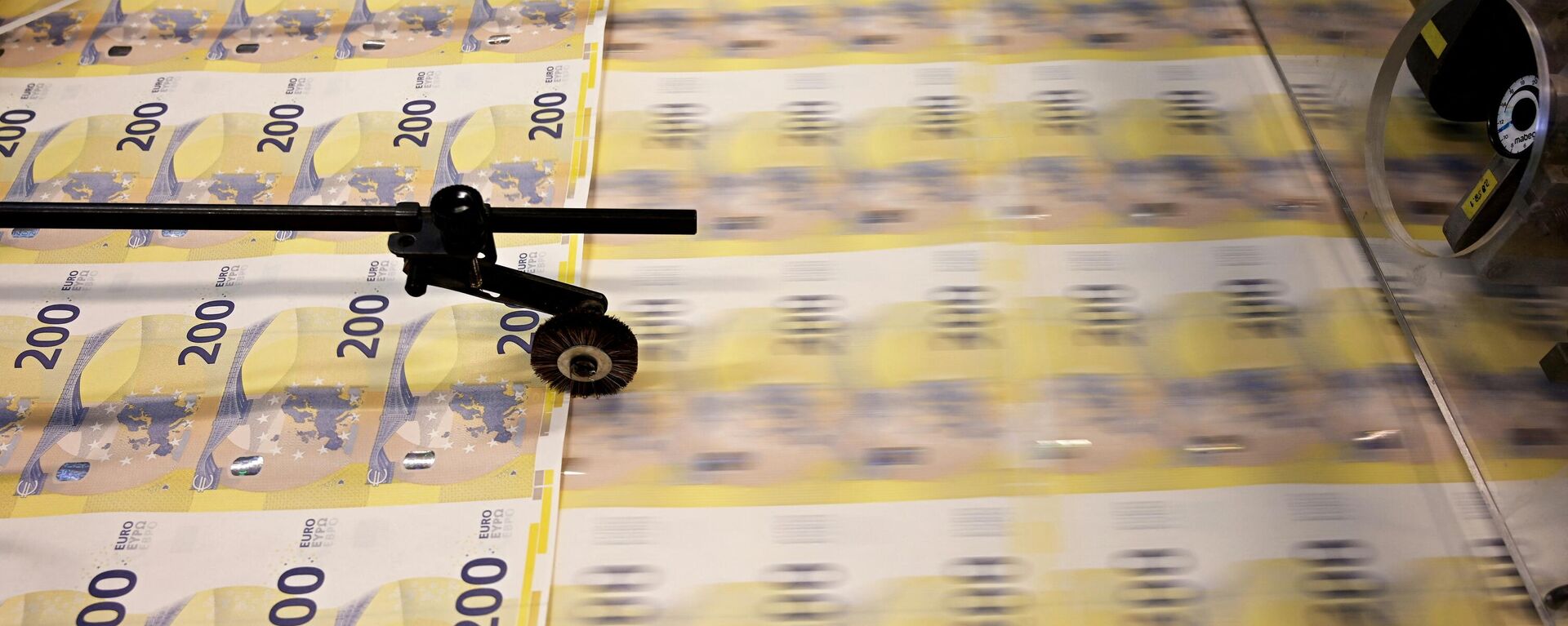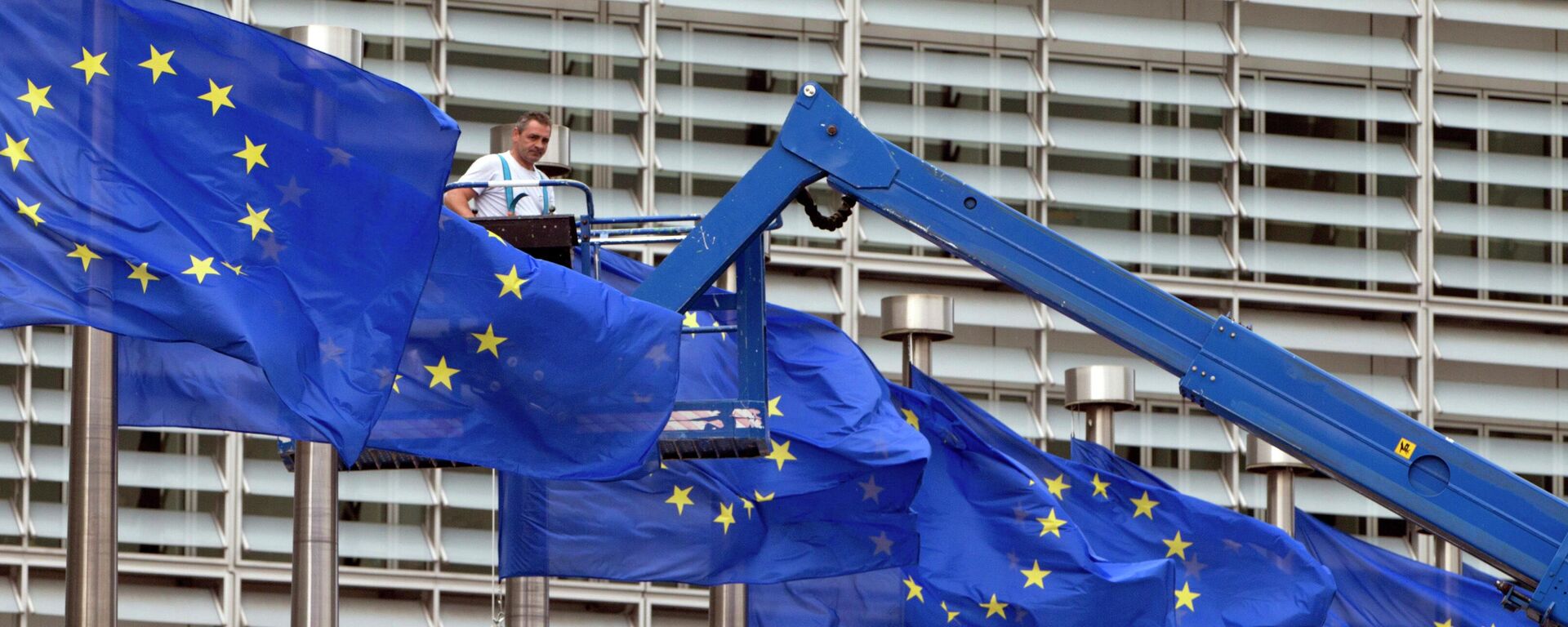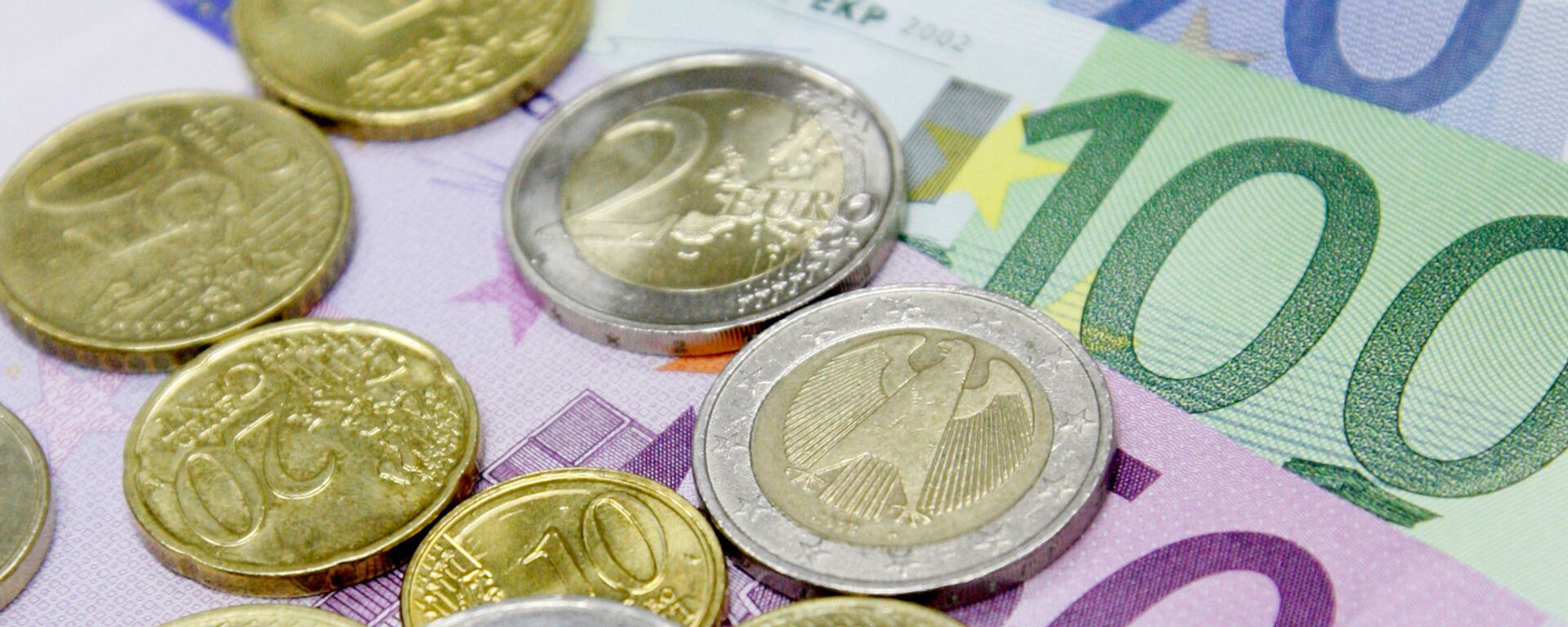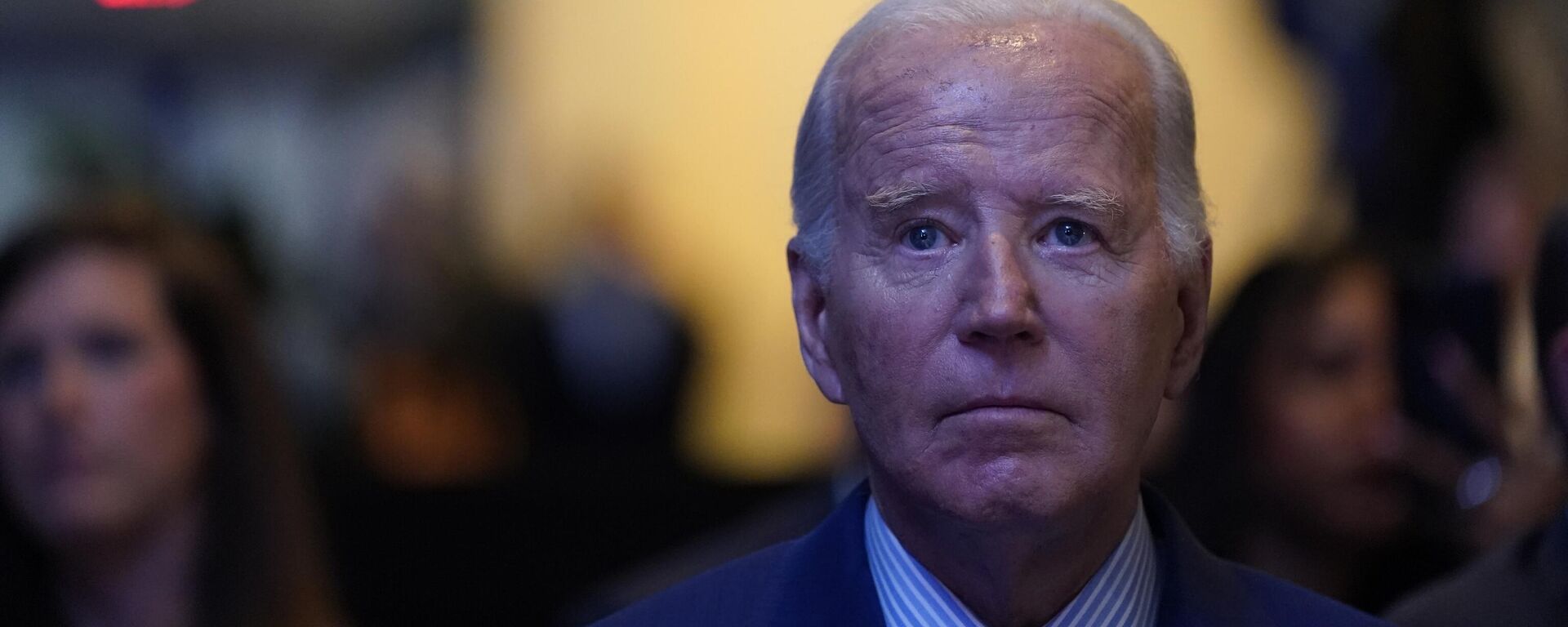https://sputnikglobe.com/20240219/eurobonds-floated-as-eu-grapples-with-ukraine-aid--depleted-weapons-stocks-1116873838.html
Eurobonds Floated as EU Grapples With Ukraine Aid & Depleted Weapons Stocks
Eurobonds Floated as EU Grapples With Ukraine Aid & Depleted Weapons Stocks
Sputnik International
Issuing Eurobonds has been floated as a way to scrape together more funds for Ukraine, and kick-start Europe's own defense industry.
2024-02-19T11:47+0000
2024-02-19T11:47+0000
2024-02-19T11:47+0000
ukraine
estonia
world
european union (eu)
nato
munich security conference
proxy war
eurobonds
eurobonds
https://cdn1.img.sputnikglobe.com/img/07e8/02/13/1116872812_0:160:3072:1888_1920x0_80_0_0_fbb612195375716f91409f6f638c99f3.jpg
Issuing €100 billion ($108 billion) in joint eurobonds has been floated as a way to not only scrape together more funds for the flagging NATO proxy war against Russia in Ukraine, but to kick start Europe's own defense industry.The eurobonds idea was insistently touted by Estonia’s Prime Minister Kaja Kallas, fresh from attending the weekend's Munich Security Conference.Amid growing signs of waning support for funding Ukraine in several European capitals, Kallas remains a fervid supporter of the proxy war. She used the interview to yet again urge EU countries to supply Kiev with weapons, no matter how depleted their own stockpiles might be, adding:"Europe has done a lot and has to also do more. That is clear... I don’t see their warehouses, but if we, as a small country, still find things that we can send, I'm sure that the bigger countries also have things that they can give or send to Ukraine."Estonia's PM also called on allies to follow her country's own pledge in January to spend 0.25% of GDP (or about 120 billion euros/$131 billion USD) over the next four years to support Ukraine.Many EU national budgets have increasingly come under strain, cash-strapped over US-driven pressure to pump more money to fund NATO's proxy war with Russia in Ukraine. Amid rapidly depleting weapons stockpiles due to the drive to arm Kiev’s regime, NATO has also been increasingly impelling its members to meet its defense spending target of at least 2% of national GDP. This explains the timing of the idea of taking a swipe at these problems by issuing eurobonds.French President Emmanuel Macron and European Council President Charles Michel have both floated the idea of special EU bonds to ramp up defense investment. Recently, Belgian Prime Minister Alexander De Croo also went on record as saying that it was a "sound idea and it's something that could help us in speeding things up." However, he added in a more sobering afterthought that "at some point, you need to be able to sustain it," in a reference to increased military spending. "You can’t sustain it by borrowing all the time," Croo warned.But the eurobonds plan is a tricky one. The idea of euorobonds issued jointly by the EU's 19 Eurozone states was first suggested during the sovereign debt crisis (2009 -2010s). Germany's then-Chancellor Angela Merkel was adamantly against it, pointing out that the EU treaty did not allow for the issuance of common bonds. The idea resurfaced several times, more recently during the coronavirus pandemic. Some critics emphasize that eurobonds could contravene Article 125 of the Lisbon Treaty, which states that the EU and its member states are not liable for the commitments of other members. It is also underscored that eurobonds would give debt-mired EU states free reign to to dip into cheaper credit at the expense of other, stronger Eurozone economies.The talk about eurobonds comes as patrons of the Kiev regime have been brainstorming how to find ways to continue to fund the flagging Ukraine "project." While the Munich Security Conference was taking place, the Russian military routed Ukraine's forces from the stronghold of Avdeyevka. The city had long been used by the Kiev regime’s nationalist troops to shell residential areas of the nearby Donbass city of Donetsk. Besides having to face Ukraine's battleground losses after sending billions' worth of weapons to President Volodymyr Zelensky’s nationalist forces, the West is now facing a plethora of procurement problems. Ukraine's supporters are now reduced to scouring previously long-overlooked sources of munitions and artillery as warehouses across the continent have been bled dry.Last month, several EU leaders and officials admitted that a joint procurement initiative to get ammunition and missiles to Ukraine within a year would not make the deadline. The EU had promised Kiev one million artillery rounds before the end of March 2024. “The hard truth: we have fallen short of this goal,” it was stated in a letter signed by Germany’s Chancellor Olaf Scholz, Dutch Prime Minister Mark Rutte, Estonian PM Kaja Kallas, and several others.
https://sputnikglobe.com/20240202/french-politician-says-54bln-in-aid-to-ukraine-will-cost-france-86bln-in-taxpayers-money-1116546030.html
https://sputnikglobe.com/20240217/eus-2024-economic-growth-forecasts-cut-as-blocs-big-guns-hit-recession-1116841060.html
https://sputnikglobe.com/20240205/burden-of-ukraine-funding-may-be-passed-onto-europe-1116606550.html
https://sputnikglobe.com/20240129/no-logical-plan-for-ukraines-war-effort-as-40-million-in-us-aid-stolen---report-1116478381.html
ukraine
estonia
Sputnik International
feedback@sputniknews.com
+74956456601
MIA „Rossiya Segodnya“
2024
News
en_EN
Sputnik International
feedback@sputniknews.com
+74956456601
MIA „Rossiya Segodnya“
Sputnik International
feedback@sputniknews.com
+74956456601
MIA „Rossiya Segodnya“
aid for ukraine, depleted weapons stockpiles, us military aid to ukraine, eu aid to kiev, us military stockpiles depleted, eu military stockpiles depleted, russian forces liberate avdeyevka
aid for ukraine, depleted weapons stockpiles, us military aid to ukraine, eu aid to kiev, us military stockpiles depleted, eu military stockpiles depleted, russian forces liberate avdeyevka
Eurobonds Floated as EU Grapples With Ukraine Aid & Depleted Weapons Stocks
How to scrape together funds to prop up the Kiev regime while not letting the EU exhaust its own defense capabilities were a prevalent concern at the Munich Security Conference. The mood of attendees was sobered by the recent routing of Kiev’s troops from their stronghold of Avdeyevka, and the US congressional deadlock over proposed Ukraine aid.
Issuing €100 billion ($108 billion) in joint eurobonds has been floated as a way to not only scrape together more funds for the
flagging NATO proxy war against Russia in Ukraine, but to kick start Europe's own defense industry.
The eurobonds idea was insistently touted by Estonia’s Prime Minister Kaja Kallas, fresh from attending the weekend's
Munich Security Conference.
"We are in a place where we need to invest more and [explore] what we can do together, as the bonds that would be issued by separate countries individually are too small to scale. Eurobonds could have a much bigger impact," Kallas told Bloomberg.
Amid growing signs of waning support for funding Ukraine in several European capitals, Kallas remains a fervid supporter of the proxy war. She used the interview to yet again urge EU countries to supply Kiev with weapons, no matter how depleted their own stockpiles might be, adding:
"Europe has done a lot and has to also do more. That is clear... I don’t see their warehouses, but if we, as a small country, still find things that we can send, I'm sure that the bigger countries also have things that they can give or send to Ukraine."
Estonia's PM also called on allies to follow her country's own pledge in January to spend 0.25% of GDP (or about 120 billion euros/$131 billion USD) over the next four years to support Ukraine.

2 February 2024, 01:40 GMT
Many EU national budgets have increasingly come under strain, cash-strapped over US-driven pressure
to pump more money to fund NATO's proxy war with Russia in Ukraine. Amid
rapidly depleting weapons stockpiles due to the drive to arm Kiev’s regime, NATO has also been increasingly impelling its members to meet its defense spending target of at least 2% of national GDP. This explains the timing of the idea of taking a swipe at these problems by issuing eurobonds.
Europe's own defense capability and Ukraine aid dominated discussions at the Munich Security Conference, which ended on Sunday. Earlier in February, the EU pushed through a €50 billion aid package for Ukraine. However, the US foreign aid package, which includes $60 billion for Ukraine, is currently stuck in Congress. House Speaker Mike Johnson was highly critical of the bill, saying that it was silent on border security. He pulled votes on the bill scheduled for Friday, instead announcing a two-week recess until February 28.
French President Emmanuel Macron and European Council President Charles Michel have both floated the idea of special EU bonds to ramp up defense investment. Recently, Belgian Prime Minister Alexander De Croo also went on record as saying that it was a "sound idea and it's something that could help us in speeding things up." However, he added in a more sobering afterthought that "at some point, you need to be able to sustain it," in a reference to increased military spending. "You can’t sustain it by borrowing all the time," Croo warned.
But the eurobonds plan is a tricky one. The idea of euorobonds issued jointly by the EU's 19 Eurozone states was first suggested during the sovereign debt crisis (2009 -2010s). Germany's then-Chancellor Angela Merkel was adamantly against it, pointing out that the EU treaty did not allow for the issuance of common bonds. The idea resurfaced several times, more recently during the coronavirus pandemic. Some critics emphasize that eurobonds could contravene Article 125 of the Lisbon Treaty, which states that the EU and its member states are not liable for the commitments of other members. It is also underscored that eurobonds would give debt-mired EU states free reign to to dip into cheaper credit at the expense of other, stronger Eurozone economies.

17 February 2024, 13:22 GMT

5 February 2024, 18:59 GMT
The talk about eurobonds comes as patrons of the Kiev regime have been brainstorming how to find ways to continue to fund the flagging Ukraine "project." While the Munich Security Conference was taking place, the Russian military routed Ukraine's forces from the stronghold of Avdeyevka. The city had long been used by the Kiev regime’s nationalist troops to shell residential areas of the nearby Donbass city of Donetsk.
Besides having to face
Ukraine's battleground losses after sending billions' worth of weapons to President Volodymyr Zelensky’s nationalist forces, the West is now facing a plethora of procurement problems. Ukraine's supporters are now reduced to scouring previously long-overlooked sources of munitions and artillery as warehouses across the continent have been
bled dry.
Last month, several EU leaders and officials admitted that a joint procurement initiative to get ammunition and missiles to Ukraine within a year would not make the deadline. The EU had promised Kiev one million artillery rounds before the end of March 2024. “The hard truth: we have fallen short of this goal,” it was stated in a letter signed by Germany’s Chancellor Olaf Scholz, Dutch Prime Minister Mark Rutte, Estonian PM Kaja Kallas, and several others.

29 January 2024, 23:48 GMT






